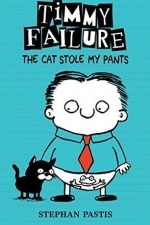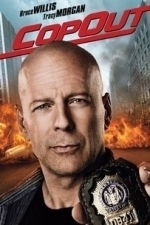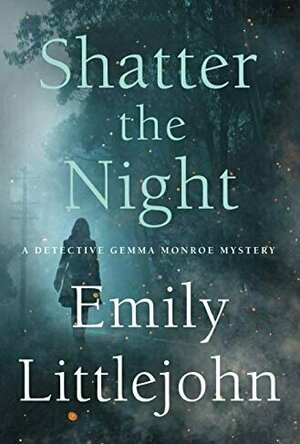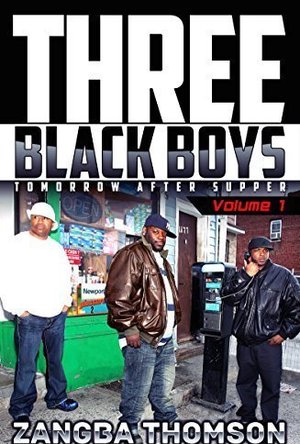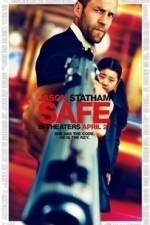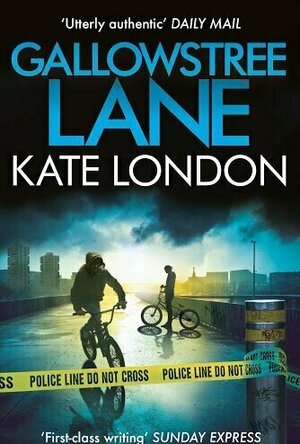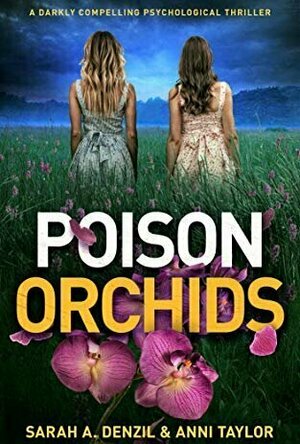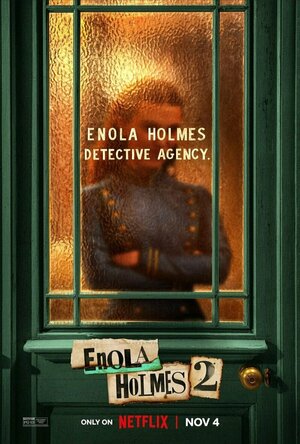Search
Hazel (1853 KP) rated Timmy Failure: The Cat Stole My Pants in Books
Dec 17, 2018
<i>I received this book for free through Goodreads First Reads.</i>
For fans of <i>Diary of a Wimpy Kid</i> (Kinney, 2004) is a juvenile series by American author, Stephan Pastis, about a young boy who believes he is the world’s greatest detective. A series that is continually growing, the sixth <i>Timmy Failure </i>story is now available for fans and new readers. Subtitled <i>The Cat Stole My Pants</i>, Timmy Failure embarks on an adventure of mystery and crime solving whilst getting himself into all sorts of mischief.
Emulating both real and fictional detectives, Timmy has established his own agency, Failure, Inc., of which he is the sole employee after the flight of his (imaginary) ex-business partner, Total the polar bear, who is currently seeking political asylum in Cuba. Unfortunately, Timmy has been forced to join his mother and Doorman Dave on their honeymoon in Key West, Florida, along with Doorman Dave’s nephew, Emilio.
“Crime doesn’t take a holiday. Neither does greatness.” Determined to continue solving crimes, Timmy hires Emilio as an unpaid intern and sets off searching for crimes, greatly over exaggerating every little piece of “evidence” he finds. However, it soon appears that someone is out to get Timmy and he, along with Emilio, is determined to find out whom.
Timmy is a melodramatic, unconventional child with a large ego and is constantly getting told off. From annoying adults to having his pants stolen by a polydactyl cat – or so he claims – there is no end to the hilarious situations he causes.
The cat that stole Timmy’s pants only makes a brief appearance in the book, therefore the subtitle is more to attract the attention of young readers with its silliness rather than be suggestive of a certain storyline.
Despite his grand claims, Timmy is not a very good detective and a lot of his unsolved crimes have been invented by his overactive imagination. This adds to the humour because, although he seems like an intelligent child, his ideas are completely silly.
Adorned with childish drawings and diagrams, Timmy Failure narrates the story from his subjective point of view, inflating his successes and blaming any failure on poor Emilio. No one takes Timmy seriously, which is something many of the target readers may appreciate, although they should also understand how futile Timmy’s attempts are at being a detective.
The storyline is not particularly clear until the final chapters of the book. Up until that moment, the book is full of disastrous, imaginary detective endeavours that prove Timmy to be nothing more than an annoying, inventive boy.
Some of the language may be above children’s reading capabilities, however, the humour is directly on their level. Whereas an adult may not find the idea of a cat stealing someone’s pants amusing, a child would find that hysterical.
There is no reason to read the <i>Timmy Failure</i> books in order, so if you, like me, read book six first, there is no problem. The stories are particularly aimed at young boys and will hopefully encourage the demographic to start reading more. Whilst it may not be a great feat of literature, it is a good enough introduction to the world of books.
For fans of <i>Diary of a Wimpy Kid</i> (Kinney, 2004) is a juvenile series by American author, Stephan Pastis, about a young boy who believes he is the world’s greatest detective. A series that is continually growing, the sixth <i>Timmy Failure </i>story is now available for fans and new readers. Subtitled <i>The Cat Stole My Pants</i>, Timmy Failure embarks on an adventure of mystery and crime solving whilst getting himself into all sorts of mischief.
Emulating both real and fictional detectives, Timmy has established his own agency, Failure, Inc., of which he is the sole employee after the flight of his (imaginary) ex-business partner, Total the polar bear, who is currently seeking political asylum in Cuba. Unfortunately, Timmy has been forced to join his mother and Doorman Dave on their honeymoon in Key West, Florida, along with Doorman Dave’s nephew, Emilio.
“Crime doesn’t take a holiday. Neither does greatness.” Determined to continue solving crimes, Timmy hires Emilio as an unpaid intern and sets off searching for crimes, greatly over exaggerating every little piece of “evidence” he finds. However, it soon appears that someone is out to get Timmy and he, along with Emilio, is determined to find out whom.
Timmy is a melodramatic, unconventional child with a large ego and is constantly getting told off. From annoying adults to having his pants stolen by a polydactyl cat – or so he claims – there is no end to the hilarious situations he causes.
The cat that stole Timmy’s pants only makes a brief appearance in the book, therefore the subtitle is more to attract the attention of young readers with its silliness rather than be suggestive of a certain storyline.
Despite his grand claims, Timmy is not a very good detective and a lot of his unsolved crimes have been invented by his overactive imagination. This adds to the humour because, although he seems like an intelligent child, his ideas are completely silly.
Adorned with childish drawings and diagrams, Timmy Failure narrates the story from his subjective point of view, inflating his successes and blaming any failure on poor Emilio. No one takes Timmy seriously, which is something many of the target readers may appreciate, although they should also understand how futile Timmy’s attempts are at being a detective.
The storyline is not particularly clear until the final chapters of the book. Up until that moment, the book is full of disastrous, imaginary detective endeavours that prove Timmy to be nothing more than an annoying, inventive boy.
Some of the language may be above children’s reading capabilities, however, the humour is directly on their level. Whereas an adult may not find the idea of a cat stealing someone’s pants amusing, a child would find that hysterical.
There is no reason to read the <i>Timmy Failure</i> books in order, so if you, like me, read book six first, there is no problem. The stories are particularly aimed at young boys and will hopefully encourage the demographic to start reading more. Whilst it may not be a great feat of literature, it is a good enough introduction to the world of books.
Gareth von Kallenbach (980 KP) rated Cop Out (2010) in Movies
Aug 8, 2019
For Detectives Jimmy Monroe (Bruce Willis), and Paul Hodges (Tracy Morgan), life on the beat is about to become very dangerous and complex. In the new movie “Cop Out” the two buddies find themselves at odds with their supervisor after a case goes horribly wrong and looking at a thirty day unpaid suspension.
This is a disaster for Jimmy as his only daughter is about to get married and he needs the money to pay for the wedding to avoid his ego having to absorb the insult of having his former wives new husband pick up the tab.
Undaunted Jimmy decides to sell a prized baseball card to cover the 48K wedding tab, and looks forward to being able to make his daughters dream wedding a reality. Things do not go as planned as Jimmy has his card stolen which forces Paul and Jimmy to take drastic actions to recover it.
The duo track down the card thief (Seann William Scott), and learn that he traded the card to a local drug lord who is as passionate about baseball as he is deadly to all those who stand in his way.
Jimmy and Paul soon realize that they must deal with the enemy in an effort to retrieve the card as his request that they find his stolen Mercedes seems a small price to pay for the safe return of the prized card.
Upon locating the Mercedes, Jimmy and Paul learn that a much larger game is afoot and find themselves on the run for goons and their fellow cops as they try to keep a key witness safe and retrieve the card.
The film has some very funny moments and Director Kevin Smith gets some good laughs from the material but the film suffers from a disjointed plot and some glaring holes which requires some major leaps of faith from the audience.
For example, we are expected to believe that a couple of thieves would steal a car and sell it but nowhere in the process would the thieves or new owner bother to look in the trunk much less hear the noises coming from within.
We are given a few bits about Jimmy and Paul, such as Paul’s paranoia regarding his wife and his inability to question a suspect, but the duo are so thinly developed the seem to have been crafted from the Buddy Cop film 101 guide.
Smith has always been a favorite of mine as I have always liked the way he blends biting satire and humor with interesting characters and conversations.
Action does not seem to yet be an area of comfort for Smith as he does pull off the action sequences in the film but they seem very restrained for what audiences have come to expect from today’s action films.
This time out Smith was limited to directing and editing and the film seems to be badly in need of his writing abilities.
Given his past issues with trying to do films for a big studio, it was a surprise to me that Smith did the film which was originally entitled “The Two Dicks”.
Thankfully his skilled handling of the cast and humor is what tips the scales in the films favor making “Cop Out” a flawed but at times very funny film.
This is a disaster for Jimmy as his only daughter is about to get married and he needs the money to pay for the wedding to avoid his ego having to absorb the insult of having his former wives new husband pick up the tab.
Undaunted Jimmy decides to sell a prized baseball card to cover the 48K wedding tab, and looks forward to being able to make his daughters dream wedding a reality. Things do not go as planned as Jimmy has his card stolen which forces Paul and Jimmy to take drastic actions to recover it.
The duo track down the card thief (Seann William Scott), and learn that he traded the card to a local drug lord who is as passionate about baseball as he is deadly to all those who stand in his way.
Jimmy and Paul soon realize that they must deal with the enemy in an effort to retrieve the card as his request that they find his stolen Mercedes seems a small price to pay for the safe return of the prized card.
Upon locating the Mercedes, Jimmy and Paul learn that a much larger game is afoot and find themselves on the run for goons and their fellow cops as they try to keep a key witness safe and retrieve the card.
The film has some very funny moments and Director Kevin Smith gets some good laughs from the material but the film suffers from a disjointed plot and some glaring holes which requires some major leaps of faith from the audience.
For example, we are expected to believe that a couple of thieves would steal a car and sell it but nowhere in the process would the thieves or new owner bother to look in the trunk much less hear the noises coming from within.
We are given a few bits about Jimmy and Paul, such as Paul’s paranoia regarding his wife and his inability to question a suspect, but the duo are so thinly developed the seem to have been crafted from the Buddy Cop film 101 guide.
Smith has always been a favorite of mine as I have always liked the way he blends biting satire and humor with interesting characters and conversations.
Action does not seem to yet be an area of comfort for Smith as he does pull off the action sequences in the film but they seem very restrained for what audiences have come to expect from today’s action films.
This time out Smith was limited to directing and editing and the film seems to be badly in need of his writing abilities.
Given his past issues with trying to do films for a big studio, it was a surprise to me that Smith did the film which was originally entitled “The Two Dicks”.
Thankfully his skilled handling of the cast and humor is what tips the scales in the films favor making “Cop Out” a flawed but at times very funny film.
Kristy H (1252 KP) rated Shatter the Night in Books
Mar 19, 2020
Cedar Valley Detective Gemma Monroe takes a break from trick-or-treating on Halloween night with her young daughter Grace and fiance Brody to visit a family friend, former Cedar Valley Judge Caleb Montgomery. Caleb tells Gemma that he's been receiving haunting anonymous threats on his life. As Gemma, Brody, and Grace return to the Halloween festivities, they hear a gigantic explosion. Gemma quickly learns it was Caleb's Mercedes. The well-respected judge is dead. This kicks off a twisted and grueling case for Gemma and her partner, Detective Finn Nowlin, leading them down the dark past of Cedar Valley. There are ties to former serial killer and the more Gemma and Finn dig, the more disturbing things they find. Even worse, it appears as if Caleb's killer might not be finished.
"We had summoned the evil to our town just as surely as if we'd mailed an invitation. We just didn't know it yet, and by the time we did know it, the damage would already be done. People would be killed. Lives would be changed."
This was such a good book, you guys. I've read the first three books in the Gemma Monroe series and really enjoyed them, and this was such an excellent addition to this series. To put it in perspective, I started reading this book about the same time as Michael Connelly's latest. I quickly realized that wouldn't work as they both involved plots with arson, and my small brain was getting addled. Well, I found this book so completely captivating that this was the one I kept with--and I mean, Connelly is my most favorite of authors. I have a cat named Harry Bosch. But there was just something about this one!
Gemma has become one of my favorite detectives. She's so easy to identify with. I love that she's a working mom, and that she can share her perspectives about working and motherhood with the reader. She even admits that she is probably a better mom because she works, but she still struggles being away from young Grace. She's human and fallible. We also see her make some strides in her personal growth in this book. She's awesome and tough, and I really like her.
"Since having my daughter, time seemed to speed up at incredible rates."
The plot in this one is wonderful. It's creepy and builds up suspense. I was completely captivated. I love a book that keeps me guessing, and Shatter The Night definitely did that. There are a lot of suspects, and it was really fun to try to figure out what was going on and who might be our bad "guy(s)." The book weaves in the town's legacy, intertwining the history and its elders, so to speak. So you have a past that features Caleb and his ancestors; the police and their history; even Gemma's family. I don't want to go deeper than that, but Littlejohn weaves it all together flawlessly.
Overall, this was a great read. Interesting story, wonderful characters (the recurring characters are the best--please live forever, Tilly Krinkle), and a strong female lead. What more can you ask for? Maybe it's time to name a cat Gemma Monroe. :) 4.5 stars.
"We had summoned the evil to our town just as surely as if we'd mailed an invitation. We just didn't know it yet, and by the time we did know it, the damage would already be done. People would be killed. Lives would be changed."
This was such a good book, you guys. I've read the first three books in the Gemma Monroe series and really enjoyed them, and this was such an excellent addition to this series. To put it in perspective, I started reading this book about the same time as Michael Connelly's latest. I quickly realized that wouldn't work as they both involved plots with arson, and my small brain was getting addled. Well, I found this book so completely captivating that this was the one I kept with--and I mean, Connelly is my most favorite of authors. I have a cat named Harry Bosch. But there was just something about this one!
Gemma has become one of my favorite detectives. She's so easy to identify with. I love that she's a working mom, and that she can share her perspectives about working and motherhood with the reader. She even admits that she is probably a better mom because she works, but she still struggles being away from young Grace. She's human and fallible. We also see her make some strides in her personal growth in this book. She's awesome and tough, and I really like her.
"Since having my daughter, time seemed to speed up at incredible rates."
The plot in this one is wonderful. It's creepy and builds up suspense. I was completely captivated. I love a book that keeps me guessing, and Shatter The Night definitely did that. There are a lot of suspects, and it was really fun to try to figure out what was going on and who might be our bad "guy(s)." The book weaves in the town's legacy, intertwining the history and its elders, so to speak. So you have a past that features Caleb and his ancestors; the police and their history; even Gemma's family. I don't want to go deeper than that, but Littlejohn weaves it all together flawlessly.
Overall, this was a great read. Interesting story, wonderful characters (the recurring characters are the best--please live forever, Tilly Krinkle), and a strong female lead. What more can you ask for? Maybe it's time to name a cat Gemma Monroe. :) 4.5 stars.
Night Reader Reviews (683 KP) rated Three Black Boys: Tomorrow After Supper in Books
Apr 6, 2020
Honest Review for Free Copy of Book
Three Black Boys: Tomorrow After Supper Volume 1 by Zangba Thomson is two books in one or it could be considered two parts of one book. This is one book that you do not want to dismiss out of turn because it just may surprise you.
Barnes, Demus, and Baker are three young black boys living in Southside Jamaica Queens, New York. The three boys are close friends and spend a lot of time together. They all have dreams of their own but their living situations make it hard for them to realize their dreams. Barnes spends his time spelling drugs and instruments of death to provide for himself and his sick mother. However, things change when Barnes takes his mother to a doctor and discovers that she has Black Fever Disease and will die in a month or less if she doesn't get a liver transplant that will cost a quarter of a million dollars. Branes, wanting to save his mother’s life, convinces his friends to help him get the money in the only way they know how, robbery.
Tomorrow After Supper is when Barnes, Demus, and Baker have a chance to redeem themselves since their intentions where pure. Ego has stollen the cosmic melatonin tree which provides everyone on Earth with their immune system and released a Death Virus on the planet. It is up to the Three Black Boys to recover the tree before everyone dies and Ego takes over.
This book not only exposes a disease (Black Fever Disease) that few have even heard of but shows how desperate things can get for those living on a low income or in poverty. The second half of the book is just as interesting and entertaining (also reminded me of Dante's Inferno) as the boys get a chance to redeem themselves. Some of the characters I was not able to fully connect into the story. The detectives and Ten-Ten Winz could have used more backstory as to how they are connected to the Three Black Boys and what they were doing. Also, some of the languages was a bit different for me.
Adults and young adults alike will enjoy this book, providing they don’t dismiss it out of turn. It would probably be fine for even middle school-aged children to read. It is very little in the lines of rough language and I believe most who read this will be impressed. I rate it 3 out of 4. Overall it had a great plot to it. Unfortunately, since a few of the characters confused me a bit I can not give it full points. This goes for both the original book and Tomorrow After Supper. I will admit I ended up looking up Black Fever Disease after reading this book.
Edited to add: I have read over some other reviews of this book and noticed that the second section seems to get a negative review in favor of the more realistic and serious first section. I enjoyed both sections equally. I feel like the second relies much heavier on symbolism and can understand how some who only read the section at face value could have found it lacking.
https://www.facebook.com/nightreaderreviews/
https://smashbomb.com/nightreader
https://nightreaderreviews.blogspot.com/
Barnes, Demus, and Baker are three young black boys living in Southside Jamaica Queens, New York. The three boys are close friends and spend a lot of time together. They all have dreams of their own but their living situations make it hard for them to realize their dreams. Barnes spends his time spelling drugs and instruments of death to provide for himself and his sick mother. However, things change when Barnes takes his mother to a doctor and discovers that she has Black Fever Disease and will die in a month or less if she doesn't get a liver transplant that will cost a quarter of a million dollars. Branes, wanting to save his mother’s life, convinces his friends to help him get the money in the only way they know how, robbery.
Tomorrow After Supper is when Barnes, Demus, and Baker have a chance to redeem themselves since their intentions where pure. Ego has stollen the cosmic melatonin tree which provides everyone on Earth with their immune system and released a Death Virus on the planet. It is up to the Three Black Boys to recover the tree before everyone dies and Ego takes over.
This book not only exposes a disease (Black Fever Disease) that few have even heard of but shows how desperate things can get for those living on a low income or in poverty. The second half of the book is just as interesting and entertaining (also reminded me of Dante's Inferno) as the boys get a chance to redeem themselves. Some of the characters I was not able to fully connect into the story. The detectives and Ten-Ten Winz could have used more backstory as to how they are connected to the Three Black Boys and what they were doing. Also, some of the languages was a bit different for me.
Adults and young adults alike will enjoy this book, providing they don’t dismiss it out of turn. It would probably be fine for even middle school-aged children to read. It is very little in the lines of rough language and I believe most who read this will be impressed. I rate it 3 out of 4. Overall it had a great plot to it. Unfortunately, since a few of the characters confused me a bit I can not give it full points. This goes for both the original book and Tomorrow After Supper. I will admit I ended up looking up Black Fever Disease after reading this book.
Edited to add: I have read over some other reviews of this book and noticed that the second section seems to get a negative review in favor of the more realistic and serious first section. I enjoyed both sections equally. I feel like the second relies much heavier on symbolism and can understand how some who only read the section at face value could have found it lacking.
https://www.facebook.com/nightreaderreviews/
https://smashbomb.com/nightreader
https://nightreaderreviews.blogspot.com/
Gareth von Kallenbach (980 KP) rated Safe (2012) in Movies
Aug 7, 2019
I’ve returned with another movie review for y’all and it should certainly come as no surprise Whatsoever that my review covers the latest edition to Jason Statham’s growing resume of action Movies. After 3 delays for its U.S. release, “SAFE” has finally arrived.
“Safe” is first and foremost an action film as one would expect from Statham
But somehow he always seems to up his game with even better actions scenes which are brilliantly Choreographed.
Some of which will have you laughing at the ineptness of his enemies
Or to the point where you’ll cringe at the very thought of the pain the characters might be going through. But as always, it’s worth it. This time, they’ve even thrown in more of a storyline and a plot twist or two that would peak Tarentino’s interest.
From writer/director by Boaz Yakin and executive producer Kevin Spacey and producer Lawrence Bender (Of Pulp Fiction and Inglorious Bastards fame), Jason Statham stars as Luke Wright. A garbage man turned second-rate cage fighter and former NYPD officer. Upon leaving the NYPD after testifying against corrupt NYPD detectives, Luke drifts from garbage man to Mixed Martial Arts fighter.
In order to support his pregnant wife. Upon winning a fight that he was supposed to lose the bad guys decides to make an example of him by brutally murdering his wife and unborn child. If this was not bad enough, the bad guys then tell Luke that they will murder anyone he comes into contact with as is illustrated when they later kill a homeless man Luke gave his shoes to.
Meanwhile, Mei (Catherine Chan) a young math prodigy, is forced to be a ‘counter’ for a Chinese triad (in essence instead of using computers, the triad forces her to memorize everything from money for drug transactions to police payoffs etc.), in order to keep the triad from killing her mother.
Upon learning of the death of her mother, Mei escapes but with the knowledge of the entire organization retained in her memory the triad hunts her down through the streets of New York City while also trying to avoid the same thugs who terrorize Luke as they have discovered who she is and want to use everything she knows to bring down their competitors.
Luke, mourning the loss of his wife and unborn child nearly commits suicide by jumping in front of a subway when he witness Mei being chased through the subway by the same goons who killed his wife.
After realizing that he is the only one who can protect Mei, Luke begins a brutal rampage through New York City battling all who stand in the way and pose a threat to Mei.
To sum up the movie briefly it is Grand Theft Auto meets “The Transporter” in New York City
minus the sex, drugs, and the modified Audi with the V-12 rocket engine.
There are plenty of shootouts, fight scenes, car chases, in even some intrigue to keep you thinking. A most excellent movie if you’re looking to take a break from the sunny weather and take refuge in a cool air-conditioned movie theater as the film is more than worth spending your hard earned cash on.
“Safe” is first and foremost an action film as one would expect from Statham
But somehow he always seems to up his game with even better actions scenes which are brilliantly Choreographed.
Some of which will have you laughing at the ineptness of his enemies
Or to the point where you’ll cringe at the very thought of the pain the characters might be going through. But as always, it’s worth it. This time, they’ve even thrown in more of a storyline and a plot twist or two that would peak Tarentino’s interest.
From writer/director by Boaz Yakin and executive producer Kevin Spacey and producer Lawrence Bender (Of Pulp Fiction and Inglorious Bastards fame), Jason Statham stars as Luke Wright. A garbage man turned second-rate cage fighter and former NYPD officer. Upon leaving the NYPD after testifying against corrupt NYPD detectives, Luke drifts from garbage man to Mixed Martial Arts fighter.
In order to support his pregnant wife. Upon winning a fight that he was supposed to lose the bad guys decides to make an example of him by brutally murdering his wife and unborn child. If this was not bad enough, the bad guys then tell Luke that they will murder anyone he comes into contact with as is illustrated when they later kill a homeless man Luke gave his shoes to.
Meanwhile, Mei (Catherine Chan) a young math prodigy, is forced to be a ‘counter’ for a Chinese triad (in essence instead of using computers, the triad forces her to memorize everything from money for drug transactions to police payoffs etc.), in order to keep the triad from killing her mother.
Upon learning of the death of her mother, Mei escapes but with the knowledge of the entire organization retained in her memory the triad hunts her down through the streets of New York City while also trying to avoid the same thugs who terrorize Luke as they have discovered who she is and want to use everything she knows to bring down their competitors.
Luke, mourning the loss of his wife and unborn child nearly commits suicide by jumping in front of a subway when he witness Mei being chased through the subway by the same goons who killed his wife.
After realizing that he is the only one who can protect Mei, Luke begins a brutal rampage through New York City battling all who stand in the way and pose a threat to Mei.
To sum up the movie briefly it is Grand Theft Auto meets “The Transporter” in New York City
minus the sex, drugs, and the modified Audi with the V-12 rocket engine.
There are plenty of shootouts, fight scenes, car chases, in even some intrigue to keep you thinking. A most excellent movie if you’re looking to take a break from the sunny weather and take refuge in a cool air-conditioned movie theater as the film is more than worth spending your hard earned cash on.
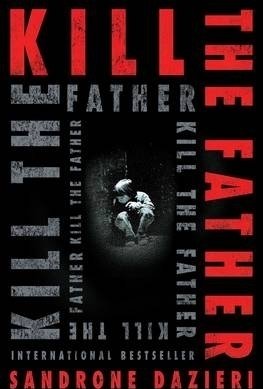
Kill the Father
Book
'The rock cast a sharp, dark shadow over a shape huddled on the ground. Please don't let it be the...
BookInspector (124 KP) rated Gallowstree Lane (Collins and Griffiths #3) in Books
Sep 24, 2020
This novel is told from multiple perspectives, and it is very hard to identify the main lead in this book. It is a Sarah Collins and Lizzie Griffiths detective novel, both of them are very strong female detectives, but they don’t have much communication between each other throughout the book, so I don’t really see them as a duo. It is a third book in the Metropolitan series, and I haven’t read the previous books. I found It perfectly understandable as a stand-alone, and the author explains a lot of things from previous books, but I think, to understand Sarah and Lizzie properly, it is better to read the previous books before starting this one.
So, a little about the characters, Lizzie is a single mother, who got pregnant after the affair with a fellow detective, who was married. Lizzie is trying her best to do her job like everybody else, but she is struggling. I really liked that the author analyzed childcare issues in this book, and how difficult is to be a mother, who wants to work and take care of her baby by her self. On the other hand, I have very strong negative emotions about her involvement with a married man in the first place, and that is what made her and Kieran (the married detective) my least favourite characters in this book.
Sarah Collins is a very determined detective, who knows how to get the stuff done. I really liked her as a character, it is visible that she loves the job and is very good at it. Kate London chose the characters very well for this novel. They are diverse, believable and very intriguing. I was very curious to read Ryan’s thoughts, he is a fifteen-year-old drug dealer, who’s friend gets stabbed. I am curious, how much actual truth was in Ryan’s thoughts compared to real life youth who act like “wannabe gangsters”. I can see that the author used her experience at the police very well, the procedures, places, the criminal mind looks very realistically portrayed in this book.
I think this book is more character orientated, the plot is intriguing, but the character’s thoughts and their lives are more absorbing than the plot itself. The plot is quite fast-paced and filled with a lot of findings, and I really enjoyed the whole investigation experience. The author analyses very important topics in this book, such as teenage criminals, knife crime, gangs and their war for territory, prostitution, drug addictions, childcare issues for working single mothers etc.
I really liked the writing style of this book, the whole book feels gloomy and intense, but at the same time, it is a very pleasant read. The setting continuously changes, depending on the character. The chapters have a very decent length and didn’t leave me bored. The ending was quite unexpected but rounded up this book quite well. So, to conclude, this is a very realistic and believable novel about teenage criminals and police work, filled with very amusing characters, and twisty plot. I learned a lot of interesting information and thoroughly enjoyed it. Especially the topics discussed in this novel. I strongly recommend this book to all, but especially to anyone living in London, I hope you will like it as much as I did.
So, a little about the characters, Lizzie is a single mother, who got pregnant after the affair with a fellow detective, who was married. Lizzie is trying her best to do her job like everybody else, but she is struggling. I really liked that the author analyzed childcare issues in this book, and how difficult is to be a mother, who wants to work and take care of her baby by her self. On the other hand, I have very strong negative emotions about her involvement with a married man in the first place, and that is what made her and Kieran (the married detective) my least favourite characters in this book.
Sarah Collins is a very determined detective, who knows how to get the stuff done. I really liked her as a character, it is visible that she loves the job and is very good at it. Kate London chose the characters very well for this novel. They are diverse, believable and very intriguing. I was very curious to read Ryan’s thoughts, he is a fifteen-year-old drug dealer, who’s friend gets stabbed. I am curious, how much actual truth was in Ryan’s thoughts compared to real life youth who act like “wannabe gangsters”. I can see that the author used her experience at the police very well, the procedures, places, the criminal mind looks very realistically portrayed in this book.
I think this book is more character orientated, the plot is intriguing, but the character’s thoughts and their lives are more absorbing than the plot itself. The plot is quite fast-paced and filled with a lot of findings, and I really enjoyed the whole investigation experience. The author analyses very important topics in this book, such as teenage criminals, knife crime, gangs and their war for territory, prostitution, drug addictions, childcare issues for working single mothers etc.
I really liked the writing style of this book, the whole book feels gloomy and intense, but at the same time, it is a very pleasant read. The setting continuously changes, depending on the character. The chapters have a very decent length and didn’t leave me bored. The ending was quite unexpected but rounded up this book quite well. So, to conclude, this is a very realistic and believable novel about teenage criminals and police work, filled with very amusing characters, and twisty plot. I learned a lot of interesting information and thoroughly enjoyed it. Especially the topics discussed in this novel. I strongly recommend this book to all, but especially to anyone living in London, I hope you will like it as much as I did.
Heather Cranmer (2721 KP) rated Poison Orchids in Books
May 4, 2020
As soon as I read the synopsis for Poison Orchids by Sarah A. Denzil and Anni Taylor, I was hooked. This sounded like something I could really sink my teeth right into. I'm a big fan of psychological thrillers, and this one did not disappoint.
Gemma and Hayley end up working on a mango farm for the very rich and very handsome Tate LLewellyn. Everything seems perfect for them...a place to live, a steady income, fun times, and a sense of belonging. However, when Gemma and Hayley end up running out in the middle of the road away from an attacker, their memories start getting foggy. Each girl tells the detectives a different story yet both don't add up. With time running out for Gemma and Hayley, the police must figure out what the real truth is if they want to save the girls.
I found the plot for Poison Orchids to be very interesting. The whole memory thing has been done before, but I felt like Denzil and Taylor gave it an original spin that kept me glued to the book. Yes, there are some parts of the plot that are a little over the top and a bit unbelievable, but even so, the plot holds its own. Despite some of the outrageous scenes, this book held my unwavering attention with its perfect pacing. I found myself wanting to know what would happen next. I found that I couldn't trust anyone (with the exception of the police) in Poison Orchids. It was as if the thrills were never ending throughout this book! While you know almost from the beginning who the baddie is, there are plenty of plot twists throughout that will leave you thinking about them long after you finish the book. However, there are no cliff hangers, and it seemed that all loose ends were tied up by the end of the book.
The characters were well fleshed out and solid. I loved both Gemma and Hayley. Sometimes I would love one more than the other, but in the end, I realized I loved them both equally. I could somewhat relate to both of them.Tate and Rodney were both written very well although I would have liked a bit more backstory on Rodney. Megan, the psychologist, was an interesting character. I enjoyed getting to know her a bit better later on in the book. What I really admired was how much she cared about Gemma and Hayley. Bronwen, the detective on the case, was a no-nonsense type of woman, and I admired that about her. She wanted answers, and she was determined to get them. Even the secondary characters all felt very realistic. I could actually picture each and every character quite easily as I was reading Poison Orchids.
Trigger warnings for Poison Orchids include profanity, alcohol use, drug use, violence, death, murder, attempted suicide, rape, assault, brainwashing, gaslighting, and cults.
All in all, Poison Orchids makes for a thrilling read that will leave you thinking about it long after you've finished reading. It's got fantastic characters and an interesting plot for sure. I would definitely recommend Poison Orchids by Sarah A. Denzil and Anni Taylor to those aged 17+ who are after a great read!
Gemma and Hayley end up working on a mango farm for the very rich and very handsome Tate LLewellyn. Everything seems perfect for them...a place to live, a steady income, fun times, and a sense of belonging. However, when Gemma and Hayley end up running out in the middle of the road away from an attacker, their memories start getting foggy. Each girl tells the detectives a different story yet both don't add up. With time running out for Gemma and Hayley, the police must figure out what the real truth is if they want to save the girls.
I found the plot for Poison Orchids to be very interesting. The whole memory thing has been done before, but I felt like Denzil and Taylor gave it an original spin that kept me glued to the book. Yes, there are some parts of the plot that are a little over the top and a bit unbelievable, but even so, the plot holds its own. Despite some of the outrageous scenes, this book held my unwavering attention with its perfect pacing. I found myself wanting to know what would happen next. I found that I couldn't trust anyone (with the exception of the police) in Poison Orchids. It was as if the thrills were never ending throughout this book! While you know almost from the beginning who the baddie is, there are plenty of plot twists throughout that will leave you thinking about them long after you finish the book. However, there are no cliff hangers, and it seemed that all loose ends were tied up by the end of the book.
The characters were well fleshed out and solid. I loved both Gemma and Hayley. Sometimes I would love one more than the other, but in the end, I realized I loved them both equally. I could somewhat relate to both of them.Tate and Rodney were both written very well although I would have liked a bit more backstory on Rodney. Megan, the psychologist, was an interesting character. I enjoyed getting to know her a bit better later on in the book. What I really admired was how much she cared about Gemma and Hayley. Bronwen, the detective on the case, was a no-nonsense type of woman, and I admired that about her. She wanted answers, and she was determined to get them. Even the secondary characters all felt very realistic. I could actually picture each and every character quite easily as I was reading Poison Orchids.
Trigger warnings for Poison Orchids include profanity, alcohol use, drug use, violence, death, murder, attempted suicide, rape, assault, brainwashing, gaslighting, and cults.
All in all, Poison Orchids makes for a thrilling read that will leave you thinking about it long after you've finished reading. It's got fantastic characters and an interesting plot for sure. I would definitely recommend Poison Orchids by Sarah A. Denzil and Anni Taylor to those aged 17+ who are after a great read!
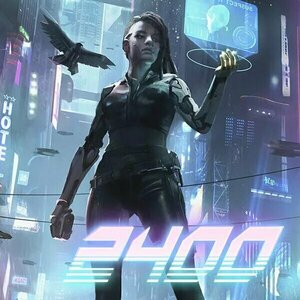
Chronicles of Crime: 2400
Tabletop Game
“You are Kalia Lavel. You’ve always wanted to fight crime like your famous ancestors, so you...
BankofMarquis (1832 KP) rated Enola Holmes 2 (2022) in Movies
Nov 14, 2022
Pleasant and Entertaining
Back in September 2020 - in the heart of the pandemic shutdown - Netflix released ENOLA HOLMES which was dubbed “the teen version of Guy Ritchie’s Sherlock Holmes” - one can decide for themselves if that is a good or a bad thing. For me, this flick was an agreeable way to spend a few hours and I, for one, was looking forward to further adventures of Enola and her more well-known older brother, Sherlock.
And, in ENOLA HOLMES 2, we get exactly that. A very entertaining way to spend a few hours with characters that continue to be a joy to while away the time - and a mystery - with.
Starring Millie Bobby Brown (11 in STRANGER THINGS), Enola Holmes 2 follows the titular character as she has opened her own, competing, Detective Agency. But, as these sorts of things go, her case ends up intertwining with her famous older sibling’s case, so we really get “Holmes and Holmes”.
And that is just fine with me for Brown and Henry Cavill (who plays Sherlock Holmes and who has previously played the MAN OF STEEL) make a winning pair, working off each other with just the right tone of mystery and fun and they look like they are having a good time figuring out the central mystery of this story.
Credit for this must go to Director Harry Bradbeer (Director of the first ENOLA HOLMES film) who came up with this story based on Nancy Springer’s characters (she wrote the ENOLA HOLMES books) and to which Jack Thorne bases his screenplay on. Bradbeer seems to understand these characters and the tone of this film. He makes just the right balance between mystery and fun - keeping the proceedings moving along at a jaunty pace, so the audience can enjoy the ride, but aren’t too jostled around by it.
Brown and Cavill fit right into this tone as does the always wonderful Helena Bonham Carter (she of many films, let’s go with A ROOM WITH A VIEW) as the mother of both of these two Detectives. The sturdy David Thewlis (Professor Lupine in the HARRY POTTER films) brings along his professionalism, comedic timing and mysteriousness as Police Inspector Grail while Louis Partridge returns as the handsome almost-love interest of Enola, Lord Tewkesbury.
Special notice needs to be made of Costumer Consolata Boyle (THE QUEEN) she populates this film with the prerequisite muted colors of 19th Century London (lots of Grey, Black and Dark Blue) but she manages to give Enola just enough of a flair in her costumes. For example, the blue of her skirt is just brighter enough than those around her to punch her up, but it is not so much brighter that it is obviously making her stick out. It is a smart, subtle touch to a very pleasing film to look at.
And that is, really, the bottom line of this movie. It is a very pleasant movie, with a mystery that is interesting enough to keep a person hooked, but not overly complex or dingy as to turn people off.
A good family film - and that is a compliment - the type of film that can be enjoyed by young and old alike.
Letter Grade: B+
7 1/2 (out of 10) stars
And you can take that to the Bank (ofMarquis)
And, in ENOLA HOLMES 2, we get exactly that. A very entertaining way to spend a few hours with characters that continue to be a joy to while away the time - and a mystery - with.
Starring Millie Bobby Brown (11 in STRANGER THINGS), Enola Holmes 2 follows the titular character as she has opened her own, competing, Detective Agency. But, as these sorts of things go, her case ends up intertwining with her famous older sibling’s case, so we really get “Holmes and Holmes”.
And that is just fine with me for Brown and Henry Cavill (who plays Sherlock Holmes and who has previously played the MAN OF STEEL) make a winning pair, working off each other with just the right tone of mystery and fun and they look like they are having a good time figuring out the central mystery of this story.
Credit for this must go to Director Harry Bradbeer (Director of the first ENOLA HOLMES film) who came up with this story based on Nancy Springer’s characters (she wrote the ENOLA HOLMES books) and to which Jack Thorne bases his screenplay on. Bradbeer seems to understand these characters and the tone of this film. He makes just the right balance between mystery and fun - keeping the proceedings moving along at a jaunty pace, so the audience can enjoy the ride, but aren’t too jostled around by it.
Brown and Cavill fit right into this tone as does the always wonderful Helena Bonham Carter (she of many films, let’s go with A ROOM WITH A VIEW) as the mother of both of these two Detectives. The sturdy David Thewlis (Professor Lupine in the HARRY POTTER films) brings along his professionalism, comedic timing and mysteriousness as Police Inspector Grail while Louis Partridge returns as the handsome almost-love interest of Enola, Lord Tewkesbury.
Special notice needs to be made of Costumer Consolata Boyle (THE QUEEN) she populates this film with the prerequisite muted colors of 19th Century London (lots of Grey, Black and Dark Blue) but she manages to give Enola just enough of a flair in her costumes. For example, the blue of her skirt is just brighter enough than those around her to punch her up, but it is not so much brighter that it is obviously making her stick out. It is a smart, subtle touch to a very pleasing film to look at.
And that is, really, the bottom line of this movie. It is a very pleasant movie, with a mystery that is interesting enough to keep a person hooked, but not overly complex or dingy as to turn people off.
A good family film - and that is a compliment - the type of film that can be enjoyed by young and old alike.
Letter Grade: B+
7 1/2 (out of 10) stars
And you can take that to the Bank (ofMarquis)
